|
|
|
Sort Order |
|
|
|
Items / Page
|
|
|
|
|
|
|
| Srl | Item |
| 1 |
ID:
140537


|
|
|
|
|
| Summary/Abstract |
Khmer New Year is the closest thing Cambodia has to a High Holiday, and in April, Prime Minister Hun Sen celebrated it in style with his fiercest opponent. During a festival at the ancient temples of Angkor, he and Sam Rainsy ate together from a gigantic cake of sticky rice weighing more than four metric tons—a Guinness World Record. It was an uncanny scene, not least because the last time Sam Rainsy had made a major public appearance at Cambodia’s most glorious site, in September 2013, it was to call Hun Sen a cheat and a usurper.
|
|
|
|
|
|
|
|
|
|
|
|
|
|
|
|
| 2 |
ID:
140533


|
|
|
|
|
| Summary/Abstract |
Although history is not usually taught this way, one could argue that cities have played a more important role in shaping the world than empires. From Athens and Rome to Paris and Venice to Baghdad and Beijing, urban ideas and innovators have left indelible marks on human life. By concentrating the brainpower of humanity in relatively small geographic areas, cities have promoted the kinds of interactions that nurture creativity and technological advances. They have been the drivers of progress throughout history, and now—as the knowledge economy takes full flight—they are poised to play a leading role in addressing the challenges of the twenty-first century.
|
|
|
|
|
|
|
|
|
|
|
|
|
|
|
|
| 3 |
ID:
140531


|
|
|
|
|
| Summary/Abstract |
In a biological sense, last year’s Ebola epidemic, which struck West Africa, spilled over into the United States and Europe, and has to date led to more than 27,000 infections and more than 11,000 deaths, was a great surprise. Local health and political leaders did not know of the presence of the hemorrhagic fever virus in the 35,000-square-mile Guinea Forest Region, and no human cases had ever been identified in the region prior to the outbreak. Its appearance in the tiny Guinean village of Meliandou in December 2013 went unnoticed, save as a domestic tragedy for the Ouamouno family, who lost their toddler son Emile to a mysterious fever. Practically all the nonbiological aspects of the crisis, however, were entirely unsurprising, as the epidemic itself and the fumbling response to it played out with deeply frustrating predictability. The world has seen these mistakes before.
|
|
|
|
|
|
|
|
|
|
|
|
|
|
|
|
| 4 |
ID:
140536
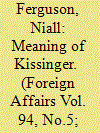

|
|
|
|
|
| Summary/Abstract |
There are reasons other than his longevity why so many world leaders—among them the Chinese President Xi Jinping—continue to seek the counsel of Henry Kissinger, who stepped down as U.S. secretary of state close to four decades ago. In this respect, Barack Obama is unusual. He is the first U.S. president since Dwight Eisenhower not to seek Kissinger’s advice. Periodically, commentators urge Obama to be more “Kissingerian.” Others argue that he is Kissinger¬ian in practice, if not in rhetoric. But what exactly does the term mean?
|
|
|
|
|
|
|
|
|
|
|
|
|
|
|
|
| 5 |
ID:
140529
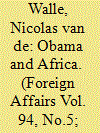

|
|
|
|
|
| Summary/Abstract |
When Barack Obama was elected U.S. president in 2008, the news was greeted with enormous hope in sub-Saharan Africa, as well as among the small coterie of Americans who follow the region closely. This son of a Kenyan father would not only understand the continent better than his predecessors in the White House, the thinking went, but he would also treat it as a strategic priority and direct more resources its way. At the time, it didn’t seem far-fetched to predict that Obama would usher in a new era of improved U.S.-African relations. Even though President George W. Bush had substantially increased aid to Africa, anti-Americanism there had grown under his watch, the result of opposition to his unilateralist foreign policy.
|
|
|
|
|
|
|
|
|
|
|
|
|
|
|
|
| 6 |
ID:
140526
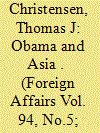

|
|
|
|
|
| Summary/Abstract |
China’s rise poses two broad challenges for U.S. foreign policy: how to deter the People’s Republic from destabilizing East Asia and how to encourage it to contribute to multilateral global governance. Although China is not yet a military peer competitor of the United States, it has become powerful enough to challenge U.S. friends and allies in East Asia and to pose serious problems for U.S. forces operating there. And although China is still a developing country with significant domestic problems, it has become an important enough actor that its cooperation is necessary to solve global problems such as nuclear proliferation, climate change, and international financial instability.
|
|
|
|
|
|
|
|
|
|
|
|
|
|
|
|
| 7 |
ID:
140527


|
|
|
|
|
| Summary/Abstract |
Even now, gazing back through the jaundiced lens of subsequent experience, Barack Obama’s 2008 campaign speech in Berlin still seems an extraordinary occasion. Tens of thousands of mostly young Germans gathered in the center of the city to listen to the American presidential candidate, in an atmosphere The Guardian described as “a pop festival, a summer gathering of peace, love—and loathing of George Bush.” Streets were closed for the occasion. Bands played to warm up the crowd.
|
|
|
|
|
|
|
|
|
|
|
|
|
|
|
|
| 8 |
ID:
140528


|
|
|
|
|
| Summary/Abstract |
In April 2009, just three months after he took office, U.S. President Barack Obama traveled to Trinidad and Tobago for the Summit of the Americas. There, he told Latin America’s leaders that he wanted to begin “a new chapter of engagement” and an “equal partnership . . . based on mutual respect and common interests and shared values.” Most dramatically, he pledged to seek “a new beginning with Cuba,” which had not enjoyed diplomatic relations with the United States for five decades.
|
|
|
|
|
|
|
|
|
|
|
|
|
|
|
|
| 9 |
ID:
140530
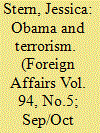

|
|
|
|
|
| Summary/Abstract |
U.S. President Barack Obama came into office determined to end a seemingly endless war on terrorism. Obama pledged to make his counterterrorism policies more nimble, more transparent, and more ethical than the ones pursued by the George W. Bush administration. Obama wanted to get away from the overreliance on force that characterized the Bush era, which led to the disastrous U.S. invasion of Iraq in 2003. That war, in turn, compromised the U.S. campaign against al Qaeda. During the past six-plus years, Obama has overseen an approach that relies on a combination of targeted killing, security assistance to military and intelligence forces in partner and allied countries, and intensive electronic surveillance. He has also initiated, although in a tentative way, a crucial effort to identify and address the underlying causes of terrorism. Overall, these steps amount to an improvement over the Bush years.
|
|
|
|
|
|
|
|
|
|
|
|
|
|
|
|
| 10 |
ID:
140525
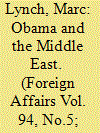

|
|
|
|
|
| Summary/Abstract |
Critics of U.S. President Barack Obama’s Middle East strategy often complain that Obama lacks a strategic vision. This is almost exactly wrong. Obama came to office with a conviction that reducing the United States’ massive military and political investment in the Middle East was a vital national security interest in its own right. The occupation of Iraq and the excesses of the war on terrorism had left the United States overextended, especially at a time of economic crisis. “Rightsizing” the United States’ footprint in the region meant not only reducing its material presence but also exercising restraint diplomatically, stepping back and challenging allies to take greater responsibility for their own security. Obama has adhered consistently to this strategy, prioritizing it ruthlessly along the way and firmly resisting efforts to force it off track. This was not a strategy much beloved in Washington or in a region hard-wired for the exercise of American power. But it was a clear and coherent strategy that led Obama to undertake major initiatives on the problems he viewed as rising to the level of core national security interests: Iran’s nuclear weapons program, terrorism, the Israeli-Palestinian conflict, and the war in Iraq.
|
|
|
|
|
|
|
|
|
|
|
|
|
|
|
|
| 11 |
ID:
140532


|
|
|
|
|
| Summary/Abstract |
America’s status as the greatest and most influential nation on earth comes with certain inescapable realities. Among these are an abundance of enemies wishing to undermine us, numerous allies dependent on our strength and constancy, and the burden of knowing that every choice we make in exercising our power—even when we choose not to exercise it at all—has tremendous human and geopolitical consequences.
|
|
|
|
|
|
|
|
|
|
|
|
|
|
|
|
| 12 |
ID:
140538


|
|
|
|
|
| Summary/Abstract |
Ever since 9/11, the United States has provided Pakistan with a steady supply of security and nonsecurity assistance. U.S. officials have justified these generous transfers—worth more than $30 billion since 2002—on the grounds that they secure Pakistan’s ongoing cooperation in Afghanistan, bolster Pakistan’s ability to fight terrorism, and give the U.S. government influence over the country’s ever-expanding nuclear weapons program. Failing to deliver this support, the argument runs, could dramatically weaken the will and capacity of Pakistan’s security forces and possibly even lead to the collapse of the Pakistani state. In that event, Pakistan’s nuclear know-how, material, or weapons could well fall into the hands of nefarious actors.
|
|
|
|
|
|
|
|
|
|
|
|
|
|
|
|
| 13 |
ID:
140499


|
|
|
|
|
| Summary/Abstract |
How should one judge a president’s handling of foreign policy? Some focus on what happens in a few lonely moments of crisis, casting the nation’s leader as Horatius at the bridge or Casey at the bat. But a better analogy would be a member of a relay team or a middle relief pitcher: somebody who takes over from a predecessor, does a hard job for a while, and then passes things on to the next guy.
|
|
|
|
|
|
|
|
|
|
|
|
|
|
|
|
| 14 |
ID:
140500


|
|
|
|
|
| Summary/Abstract |
Rose devotes much of his article to rehearsing a litany of the Bush administration’s sins in an effort to persuade readers that Obama inherited a uniquely bad set of cards when he came to the White House—a “mess,” as the president liked to say—and must therefore be judged accordingly. But this is doubtful as a matter of history and past its sell-by date as a form of apology.
|
|
|
|
|
|
|
|
|
|
|
|
|
|
|
|
| 15 |
ID:
140535


|
|
|
|
|
| Summary/Abstract |
As the United States grew from a small set of colonies into a global hegemon, so did the geographic reach of its laws. From civil law to criminal law to human rights law, U.S. statutes now govern activity in every corner of the globe. Indeed, as recent news attests, soccer officials in Europe, cybercriminals in China, and multinational corporations operating in Africa are well within the United States’ legal cross hairs. As a result, the judges charged with interpreting U.S. laws have become crucial players in the exercise of American power.
|
|
|
|
|
|
|
|
|
|
|
|
|
|
|
|
|
|
|
|
|